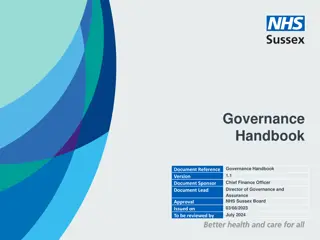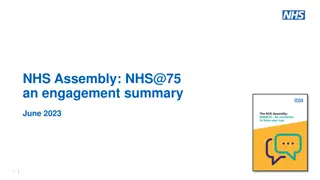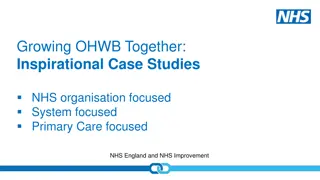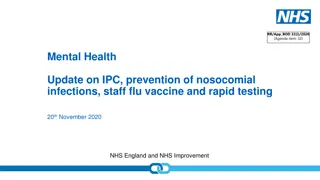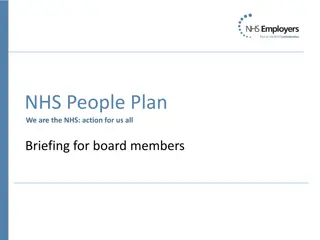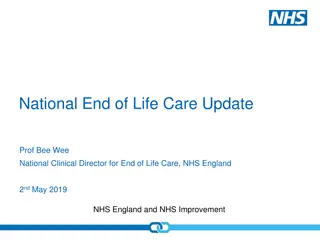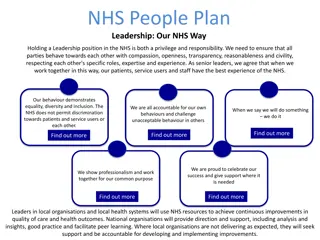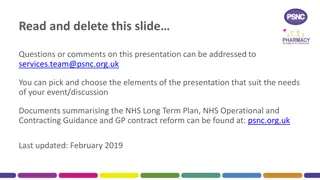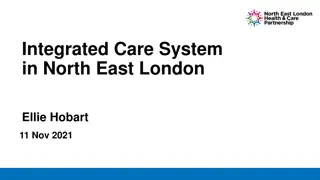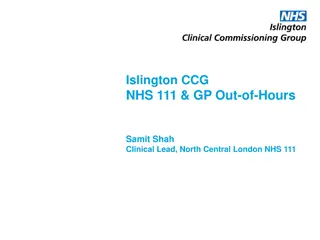Life in the NHS after the Health and Care Bill
The Health and Care Bill introduces significant changes in the NHS landscape, emphasizing Integrated Care Systems, Boards & Partnerships. It shifts from the purchaser-provider split to Provider Collaboratives and introduces Aligned Incentive Contracts. This article breaks down key points and decodes jargon surrounding the new approach for Specialised Commissioning, providing insights into the future of healthcare in the UK.
Download Presentation

Please find below an Image/Link to download the presentation.
The content on the website is provided AS IS for your information and personal use only. It may not be sold, licensed, or shared on other websites without obtaining consent from the author.If you encounter any issues during the download, it is possible that the publisher has removed the file from their server.
You are allowed to download the files provided on this website for personal or commercial use, subject to the condition that they are used lawfully. All files are the property of their respective owners.
The content on the website is provided AS IS for your information and personal use only. It may not be sold, licensed, or shared on other websites without obtaining consent from the author.
E N D
Presentation Transcript
Brave New World Life in the NHS after the Health and Care Bill
What we will cover Key points from the Health and Care Bill Integrated Care Systems, Boards & Partnerships Purchaser-provider split replaced by Provider Collaboratives Activity x tariff contracts replaced by Aligned Incentive Contracts National Tariff replaced by NHS Payment Scheme New approach for Specialised Commissioning
Firstly, a quick jargon buster! Term Meaning Integrated Care System The collective term for the NHS organisations that cover a specified geographical area, large enough to plan strategically, with input from non-NHS partners Integrated Care Board The proposed governing body of an ICS, as set out in the Bill Integrated Care Partnership A proposed joint planning committee of NHS, local govt and other interested parties covering an ICS, as set out in the Bill Place A natural locality within an ICS covering 250-500k people, typically coterminous with a local authority and/or former CCG Provider Collaborative A number of providers working jointly across multiple Places to achieve specified objectives, from loose alliance working to a formal contractual joint venture Place-Based Partnership Similar to a Provider Collaborative, but where providers work in a single Place Integrated Care Provider Previous term used in The NHS Long-Term Plan for provider collaborative working, usually specifically referring to integrating primary and secondary care, sometimes also social care
Sorry, more jargon Term Meaning Alliance Contracting Where a commissioner holds a contract involving multiple providers Provider Alliance The collective term for the providers that are party to an alliance contract Prime contractor The lead party within a provider alliance, who holds the head contract with the commissioner. In practice, used interchangeably with prime provider. Prime provider A type of prime contractor, where the contractor also provides some of the contracted services. In practice, used interchangeably with prime contractor. Aligned Incentive Contract (AIC) General term for a contract where the payment mechanism is based on a fixed block payment, plus a smaller gain/risk share element depending on performance in year Aligned Payment & Incentive Approach Specific national rules for implementing AICs, as set out in the 2021/22 National Tariff Payment System guidance (effective from 1/10/21) Patient Outcomes A quantifiable measure of the health benefit delivered to patients, e.g. reduction in under-75 mortality rate from cardiovascular disease
Latest guidance can be found here National Tariff/ Payment Reform NHS Standard Contract Integrated Care Systems (2022/23 not yet published, out to re-consultation until 25 March) (2022/23 contract published 2 March) https://www.england.nhs.uk/publication/integrated-care-systems-guidance/ https://www.england.nhs.uk/pub lication/integrated-care-systems- guidance/ https://www.england.nhs.uk/publication/integrated-care-systems-guidance/ https://www.england.nhs.uk/pay-syst/national-tariff/ https://www.england.nhs.uk/pay -syst/national-tariff/ https://www.england.nhs.uk/nhs-standard-contract/ https://www.england.nhs.uk/nhs -standard-contract/ https://www.england.nhs.uk/publication/integrated-care-systems-guidance/ https://www.england.nhs.uk/pay-syst/national-tariff/ https://www.england.nhs.uk/nhs-standard-contract/
Health and Care Bill
Health and Care Bill: key points Broadly welcomed More controversial? Formalises what s happened anyway integrated systems, bigger role for local govt, single regulator Triple aim of better population health, quality of care and sustainable use of resources Removes quasi-market competition and procurement rules Local flexibility encouraged will that last? Payment reform national tariff replaced with NHS Payment Scheme and locally agreed pricing New powers for Sec of State to intervene in reconfigurations and to direct NHSE Govt proposals on social care reform very limited in scope mainly funding mechanism, only 1.8bn pa new investment thus far Nothing yet on future role of public health No big strategy to address workforce shortages and current staff exhaustion Overlapping roles of NHSE v ICB v ICP v Places v Neighbourhoods?
Progress to date ICS from 1 July 2022? 6 July 2021 24 November 11 January 2022 30 March 19 April Entered House of Commons (first reading) Entered House of Lords (first reading) House of Lords committee stage House of Commons start considering Lords amendments ( ping pong stage) Commons returns from Easter recess Cleared House of Commons after third reading (majority 50 votes) House of Lords passed amended Bill back to Commons after third reading House of Lords second reading Commons rises for Easter recess Royal Assent 23 November 7 December 23 March 31 March May 2022?
March 2022: Secretary of States 4 Ps: Prevention Personalisation Performance People Long-term workforce plan Personalised budgets COVID backlog Big data & AI Community Diagnostic Centres Partnerships for reform Leadership review Patient voice Right to Choose Vaccination Cardiovascular disease Digital first
Integrated Care Systems, Boards & Partnerships
Integrated Care Systems NHS England Care Quality Commission NHS England regions Integrated Care Systems ICP ICB provider collaboratives place-based partnerships primary care networks
Integrated Care Boards & Partnerships Integrated Care Board Statutory body under the Bill Must have a Chair and at least 2 non-executive directors plus Chief Executive, Chief Finance Officer, Chief Nursing Officer and Chief Medical Officer plus at least 1 member nominated by each of providers, primary care & local govt Chair and Chief Executive appointed by NHS England Integrated Care Partnership Statutory joint committee between NHS and Local Govt under the Bill One member appointed by ICB and by each local authority Other members appointed by ICP locally Charged with preparing integrated care strategy for ICS https://www.england.nhs.uk/wp-content/uploads/2021/06/B0886_Interim-guidance-on-the-functions-and-governance-of-the-integrated-care-board-August-2021.pdf
Integrated Care Boards & Partnerships Integrated Care Partnership Integrated Care Board Chief Exec 3 x Execs Chair 2 x NEDs ? Chair ? Reps from each LA Provider rep LA rep PC rep ICB rep ? Primary Care Local Authorities Providers https://www.england.nhs.uk/wp-content/uploads/2021/06/B0886_Interim-guidance-on-the-functions-and-governance-of-the-integrated-care-board-August-2021.pdf
Provider Collaboratives
Provider Collaboratives Acute and MH providers asked to work collaboratively at greater scale Could be any combination of: Loose alliance with joint committee(s), possibly joint Board members Contractual model lead provider with subcontracted providers Joint venture model JV agreement between provider members Trust mergers/takeovers Expected that ultimately collaboratives will have ICB s commissioning functions delegated to them and ICB only deals with strategic commissioning
Provider collaborative example: loose alliance Also known as: Alliance contracting Integrated care partnerships Integrated care providers Other providers outside collaborative (unplanned activity, planned extra capacity etc) Integrated Care Board manages ICS overall Provider Collaborative loose alliance with joint committee(s) and possibly sharing Board members Provider 1 Integrated Care Board Non- contracted provider Provider 2 Non- Provider 3 contracted provider https://www.england.nhs.uk/wp-content/uploads/2021/06/B0754-working-together-at-scale-guidance-on-provider-collaboratives.pdf
Provider collaborative example: lead provider model Other providers outside collaborative (unplanned activity, planned extra capacity etc) Integrated Care Board manages ICS overall Provider Collaborative Led by one member, who subcontracts to other members Non- Integrated Care Board Lead Provider contracted provider Non- contracted provider Sub- Sub- Sub- contracted provider contracted provider contracted provider https://www.england.nhs.uk/wp-content/uploads/2021/06/B0754-working-together-at-scale-guidance-on-provider-collaboratives.pdf
Provider collaborative example: joint venture model Other providers outside collaborative (unplanned activity, planned extra capacity etc) Integrated Care Board manages ICS overall Provider Collaborative Joint Venture governed by a JV agreement and with a distinct identity tends to end up with joint committees/Boards, then Trust merger! Provider 1 Non- Integrated Care Board contracted provider Provider 2 Non- contracted provider Provider 3 https://www.england.nhs.uk/wp-content/uploads/2021/06/B0754-working-together-at-scale-guidance-on-provider-collaboratives.pdf
Place-Based Partnerships Integrated Care Board manages ICS overall Place-Based Partnership Partnership Board with pooled budget Integrated Care Board Local Authority Provider 1 e.g. community provider Provider 2 e.g. GP federation Provider 3 e.g. social care provider https://www.england.nhs.uk/wp-content/uploads/2021/06/B0660-ics-implementation-guidance-on-thriving-places.pdf
Some possible types of collaboration Footprint Scope Focus Potential Objectives Cross-system collaborative All organisations providing NHS and social care Defined population that crosses ICS boundaries, e.g. adolescent eating disorders Economies of scale Consistent service offer Integrate health & social care largest System-wide horizontal collaborative All acute NHS providers in our ICS Best possible service provision within our ICS s limited resources Rationalise acute services and staff across sites Strategic forward planning System-wide vertical collaborative Acute, mental health and social care providers in our ICS Frail older people in our ICS with >2 LTCs Integrate hospital & out-of-hospital care Reduce emerg admissions to hospital Place-based partnership Community, primary, social and voluntary care services Defined locality population, e.g. older people in our PCN Integrated health, well-being & prevention service Neighbourhood partnership Primary Care Network Defined neighbourhood with specific health needs Integrated primary care service (GPs, nurses, dentists, pharmacy, opticians, etc) smallest
Aligned Incentive Contracts
Navigating the new world As we move away from activity x price and towards risk sharing contracts what will we measure and how will we pay for it? 1. Understanding and documenting service pathways 2. Commissioning for patient outcomes 3. Costing and benchmarking Distinguishing outcomes from inputs and outputs Why commission for outcomes? Measuring outcomes using KPIs Why look at provider costs? How does provider costing work? National guidance Benchmarking efficient costs Shared understanding of the services required Simple charts & maps Getting the right people in the room
Understanding and documenting ICS service pathways WHO? WHY? HOW? WHAT? WHERE? Who is the service for? What is the patient cohort? Why deliver in this way? What is the national or local evidence? How do patients get referred in? How do they get discharged? What is the best clinical practice? What are the pathway stages? Where will the service be delivered? A good way to start working more collaboratively is to develop a shared understanding of the main service pathways provided to the ICS population You could use the NHS Standard Contract service spec template or your own formats
Commissioning for outcomes The NHS Outcomes Framework sets out high-level national key outcomes: Domain 1 Preventing people from dying prematurely Domain 2 Enhancing quality of life for people with long-term conditions Domain 3 Helping people to recover from episodes of ill health or following injury Domain 4 Ensuring that people have a positive experience of care Treating and caring for people in a safe environment & protecting them from avoidable harm Domain 5 https://digital.nhs.uk/data-and-information/publications/statistical/nhs-outcomes-framework
Aligned incentive contracts Aim is to incentivise different parts of local health systems to work together to deliver patient benefit (using measurable outcomes) Unlikely that any single provider of care can deliver patient outcomes in isolation from other providers Understand how resources used across the whole patient pathway, rather than individual provider contracts So let s design contracts and payment terms that encourage this, rather than each provider trying to maximise its volume of activity under a traditional PbR volume x price contract
What might this look like in practice? Payments based on block element to provide financial stability and cover for fixed costs, so change is not immediately gridlocked Plus incentive element for contributing towards patient outcomes and/or risk/gain sharing agreement on volume/cost pressures No blame/no fines for failure system uses data to work out how to improve its performance Contract levers only used as a backstop seen as a sign of system failure that needs to be addressed at source
NHS Standard Contract 2022/23 NHSE have gone for minimal change, given everything else that is going on The usual raft of minor tweaks to reflect latest govt policies National scheme to novate signed contracts from CCGs to ICBs on 1 July No longer need to exchange GCs/SCs as will be published online nationally National op/quality standards (sch 4A/4B) moved to SCs, no more fines for failure No more SCFMA (sch 9), as duty to collaborate will be required by law (?) Challenge is to use the docs to introduce changes envisaged by the Bill but arguably not really suited to new world of ICS and provider collaboratives
Payment reform: end of the national tariff?
Payment Reform: evolution or revolution? Health and Care Bill replaces national tariff with NHS Payment Scheme NHSE must consult on and publish pricing rules each year which may or may not include national prices Moving away from published prices towards guidance and tools that facilitate each ICS designing its own payment rules within national policy framework 2022/23 national tariff (re-)consultation proposes evolution of the 2021/22 Aligned Payment & Incentive framework
Proposed national support for locally designed payments NHS Payment Scheme expected to include National Tariff (non-mandatory) and local pricing rules (mandatory) National Cost Collection analysis of providers historic costs v peers to enable benchmarking, planning, intelligent payments, etc Costed GIRFT pathways costing of exemplar pathways to enable comparison and discussion, starting with cataracts Population group analysis analysing population resource usage by segment Programme budgeting whole system costs by healthcare condition The Model Health System website brings these tools together (https://model.nhs.uk/)
National Tariff 2022/23 consultation: Aligned Payment & Incentive approach Majority of payment to be fixed block basis and % to be locally agreed Remainder to be variable payment to reflect elective volume +/- @75% of price best practice tariff achievement (top up ) CQUIN achievement (1.25% included in block/tariff, can be clawed back) Applies to contracts where either members of the same ICS or over 30m pa Also note reform of Non-Contract Activity to block-based payment Mandated in theory from 1/4/22 (NB Tariff not yet published in practice could be 1/7/22 when ICSs due to commence?)
Possible future contract/payment flows: provider collaboratives Provider Collaborative Lead provider Sub-con provider NHS England ICB Provider Collaborative Provider 1 Provider 2 delegation funding contract
Possible future payment flows: place-based partnerships Place Providers Local Authority Place-Based Joint Committee NHS England ICB Providers delegation funding contract
Changes to Specialised Commissioning
Changes to specialised commissioning: 4 principles set out by NHS England Specialised services will continue to be commissioned on the basis of national evidence-based service specs Commissioning, decision-making and accountability will take place at the appropriate level ICS, supra-ICS or nationally Clinical networks and provider collaboratives will drive service improvement and transformation Funding to be rebased from host provider back to population-based https://www.england.nhs.uk/wp-content/uploads/2021/01/integrating-care-next-steps-to-building-strong-and-effective-integrated-care-systems.pdf
Changes to specialised commissioning: envisaged timetable By April 2022 (July 22?): By April 2023: ICBs will establish mechanisms to strengthen joint working between NHS England and NHS Improvement and ICSs, including through joint committees, across all areas of direct commissioning ICBs will have taken on delegated commissioning responsibility for a proportion of specialised services (subject to system and service readiness) with national standards and access policies remaining at a national level https://www.england.nhs.uk/commissioning/wp-content/uploads/sites/12/2021/07/PAR817-NHS-England-and-NHS-Improvements-direct-commissioning- functions.pdf
Finally summing up the vision of the brave new world
What might this look like for a CCG/ICB? Provider collaboratives will drive much of the new agenda operationally, taking on delegated responsibility for day-to-day commissioning as well as providing services ICBs & ICPs will have overall strategic oversight of the ICS s desired patient outcomes and manage the funding of the integrated care strategy Annual contracts replaced with longer term funding agreements that provide more stability and opportunity to plan than monthly activity x tariff This will include most specialised commissioning, delegated from NHSE to ICBs and provider collaboratives to manage, within national specs
What might this look like for a Trust? Acute & MH Trusts should be part of one or more collaboratives by April 2022 Community & Primary care join Place-Based Partnerships Over time, day-to-day commissioning/contracting will be delegated from the ICB to the provider collaboratives/partnerships Specialised commissioning, where the main catchment area is the ICS, will also be delegated to provider collaboratives to deliver national specs Contracts will evolve from activity x national tariff to locally-agreed block funding based on efficient cost , plus incentive payments for delivering agreed patient outcomes (which could include activity volume)
Integrated Care Systems: our thoughts in a nutshell Opportunity to work differently and align the local system around common objectives Can we develop a new model of networked leadership or will ICB become another layer of desktop management? Put the horse before the cart start with the patient and the desired outcomes Redirect management time spent on contract disputes to improving patient services Money will be the biggest constraint, particularly given public expectation around clearing COVID backlog but it always is! And the challenge of culture leadership culture will eat the ICS strategy for breakfast!
Hope you found this useful Training slides on a variety of topics are available at: http://baileyandmoore.com/resources/training-slides/






